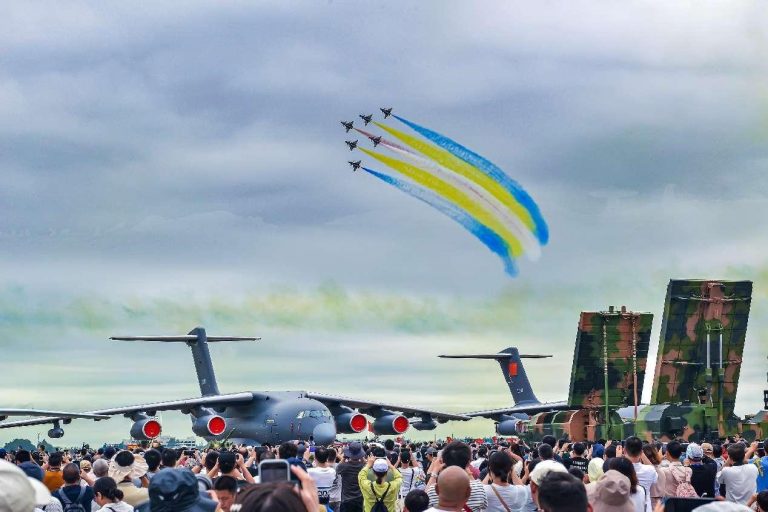
By Qiu Chaoyi, The 15th China International Aviation and Aerospace Exhibition, also known as Airshow China, was held in Zhuhai, south China’s Guangdong province from Nov. 12 to 17. The event was joined by over 1,000 enterprises from 47 countries and regions.
From major national defense equipment to intelligent devices, and from green technologies to low-altitude economy, the 15th Airshow China showcased the technological innovations in China’s aviation, aerospace, and defense sectors, building a platform for domestic and international companies to exchange and collaborate.
Around 285.6 billion yuan (about $39.7 billion) worth of deals were signed at the exhibition, involving a record 1,195 aircraft.
At the exhibition, a large number of cutting-edge products made their debut, dazzling the audience.
China Aerospace Science and Technology Corporation (CASC) brought nearly 200 technological achievements to the event, including the Chang’e-6 lunar probe and Long March 12 carrier rocket. Seventy-five percent of these achievements were unveiled for the first time.
In particular, a model of the world’s first geostationary microwave meteorological satellite caught audience’s attention. “After years of research and development, we have overcome a series of technical challenges. This satellite can achieve three-dimensional detection of clouds, rain, and atmospheric internal structures in real-time, all-weather, and high-frequency,” said Yang Zhihao, deputy director of the science and technology committee of the Shanghai Academy of Spaceflight Technology, CASC.
The satellite is expected to be launched around 2026 and will play an active role in disaster prevention and reduction, Yang revealed.
Intelligent unmanned equipment of all types were a highlight at the exhibition. “The application of intelligent equipment and command control systems has equipped us with the wings of informatization, digitization, and unmanned operation,” said Cheng Ziheng, a spokesperson of China North Industries Group Corporation Limited.
Among the 67 exhibited products brought to the event by Aero Engine Corporation of China, nearly half were unveiled for the first time. Many green products of the corporation left a deep impression on the audience.
At the entrance of the exhibition hall, there were two domestically produced engines, the CJ2000 and CJ1000A. “They are used for wide-body and single-aisle aircraft respectively, featuring low emissions, low noise, and low fuel consumption,” said Yang Song, a spokesperson of Aero Engine Corporation of China.
Prior to the event, a special sea bass auction was held in Zhuhai. A drone flew to a remote sea farming platform, where it was loaded with 150 kilograms of sea bass, and returned to the auction site in just 10 minutes. Upon opening the box, the fish were still lively.
With the booming development of low-altitude economy, a low-altitude economy pavilion was set up at this year’s Airshow China. In addition to showcasing new products and applications, the event also hosted various forums, performances, signings, and other activities to provide a platform for exchange and cooperation in the development of the low-altitude economy.
As the number of low-altitude aircraft surges, how to manage them in a science-based and efficient manner has become a hot topic. Some companies provided solutions at the air show.
For example, Aviation Industry Corporation of China exhibited a series of low-altitude security equipment, which can be used to protect important facilities such as airports, warehouses, oil fields, and substations. Guangzhou Haige Communications Group launched a low-altitude flight management service platform, which can provide full-process services before, during, and after flights. China Electronics Technology Group Corporation showcased a low-altitude flight management service platform that supports real-time monitoring of more than 100,000 flight operations.
As one of the world’s top five air shows, the Airshow China serves not only as a showcase for new equipment, technologies, and applications from both domestic and international participants, but also as a major stage for aviation and aerospace companies to deepen cooperation and expand their market presence.
It is reported that the number of foreign exhibitors at this year’s Airshow China increased by 104 percent compared to that in the previous edition, with countries such as Russia, France, the United States, Saudi Arabia, and Italy taking part in group displays. Leading global aviation companies like Airbus and Embraer also came to the event to seek cooperation opportunities.
Today, China is Airbus’s largest single-country market. Airbus predicted that over the next 20 years, more than 20 percent of the total global demand for new passenger and cargo aircraft will come from the Chinese market.
During the air show, Airbus signed a series of cooperation agreements covering various areas such as innovative research and development and industrial collaboration.
George Xu, CEO of Airbus China, said that the company will continue to expand its presence in China, support the high-quality development of the Chinese aviation industry, and actively contribute to the global aviation sector.
This year, GE Aerospace joined the Airshow China as an independent brand for the first time. Its joint ventures have signed strategic cooperation agreements with several Chinese airlines, securing orders worth nearly $1.9 billion.
Xiang Weiming, vice president of GE Aerospace, expressed confidence in the prospects of the Chinese market. He said the company will continue to expand its aircraft engine maintenance network in China, increase investment in production and manufacturing, and support the development of China’s civil aviation industry.










